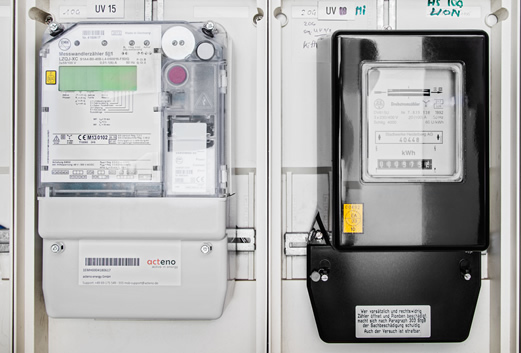acteno Metering Operation
Your metering operation – for simple & complex metering concepts
- All networks
- All installations
- All locations

Metering Operation with acteno
We are your independent metering operator – independent, Europe-wide, all networks, all voltage levels, all installations.
Whether you manage a single site with one connection point or hundreds of sites – with acteno, you gain the necessary insight into your energy.
We offer metering operation for electricity, covering load profile meters, iMSYS as 3-point, standard household meters, DIN rail or 19-inch rack installation. We install bidirectional meters – capturing both active and reactive energy in quadrants I-IV.
Energy productivity, cost control, and consumption monitoring can only work if metering data is continuously and consistently collected at a high resolution. We offer our comprehensive solution from conception, planning, coordination, installation, and operation. Switching to acteno offers clear benefits for your company, especially for operators of renewable energy systems.


Metering Operation with acteno
We take care of all your metering requirements comprehensively. We conceptualize, plan, install, and operate the measuring equipment for all your installations at all locations. Based on this, we provide a holistic real-time access to your data with the HybridNet platform.
- Access for all installations, locations – regardless of networks and voltage levels
- Implementation of your simple and complex energy concepts
- Direct data integration into your systems
- Real-time access


Switch now
- Commissioning acteno energy for the implementation of metering operation and metering services.
- We install our intelligent metering system at all your locations, in all networks and voltage levels.
- You utilize our acteno energy performance management (epm) and understand your energy.
Our Services
With the opening of metering for electricity and gas in 2011, there was a complete liberalization of the metering operation and measurement sectors. This means that customers (commercial, private, public) have the freedom to choose a metering point operator and metering service provider. acteno energy is a metering point operator according to §3 MsbG. acteno energy offers independent metering operation for industrial and commercial customers.
Your Benefits
In combination with acteno energy performance management, you receive a powerful tool to oversee and evaluate all metering systems across organizations.


- Metering Operation Nationwide
- Turnkey Implementation: Planning, Coordination, Installation & Operation
- Execution of WIM Processes
- Open Interfaces: Meter Data Exchange via API, MSCONS, AS4
- Provision of Metering & Communication Technology
- Independent of Suppliers and Network Operators
- All Voltage Levels: Low Voltage 400,690V, Medium Voltage, High Voltage, Extra High Voltage
- Transformer & Direct Measurements
- One Central Point of Contact and Unified Data Format
- All Energy Data in Real-time
- Load Profile and Reactive Power Analysis


- Control and Security over the Planned Energy Budget
- Visualization and Reports for Internal Use
- Benchmarking
- Notification of Critical (Network) Events
- Export to Third-party Systems (e.g., as XLS, CSV, XML, API)
- Load Management
- Aggregation, Balancing
- Forecasts
- Custom Project Implementation
The Metering Point Operation Act (MsbG), which came into force on September 2, 2016, plays a crucial role by consolidating regulations for measurements and metering point operation. This law also establishes the foundations for the digitalization of metering by defining technical standards, financing models, and data transmission for digital metering systems.
acteno is a nationally operating competitive metering point operator and implements metering point operation, especially for commercial enterprises, industry, real estate, and operators of renewable energies.
Metering
Regulation
The amended Metering Point Operation Act (MsbG), a core element of the law on the digitalization of the energy transition, came into force on May 27, 2023. When the MsbG was originally introduced in September 2016, it established metering point operation and measurement as independent sectors within electricity and gas supply networks.
What types of metering systems are there?
What is a load profile meter /rLM ?
The rLM (registering load profile) metering, abbreviated as “registering load measurement,” is a method used for consumers with an annual consumption of more than 100 MWh or for generating plants with an installed capacity of more than 100 kWp.
Unlike conventional meters, rLM meters continuously record the actual electricity consumption/generation in predefined time intervals. The interval in Germany is 15 minutes. For electricity, both active power and reactive power are measured in quadrants QI, QII, QIII, and QIV. The time synchronization at acteno is done depending on the application either via NTP or GPS.
What is an intelligent measuring system (iMS)?
These meters are often referred to as “Smart Meters.” They offer the ability to digitally display your consumption data and store this data in the device for up to two years. The meter reading is recorded at 15-minute intervals. Unlike mME devices, iMS devices can exchange data packets using a gateway and a data connection certified by the Federal Office for Information Security (BSI). These data packets may only be accessed and processed by certified and verified market participants, such as your network operator or electricity supplier.
However, these measuring systems are currently only intended for customers in low voltage with an annual consumption of up to 100 MWh and for generating plants with an installed capacity of less than 100 kWp.
What is a modern measuring equipment (mME)?
This type of meter has a digital display panel and has the ability to archive your generation/consumption data internally for up to two years. However, they do not have a connection to a data network, which means that they cannot send or receive data. acteno relies exclusively on measuring systems that can be continuously integrated via a data network and therefore does not offer modern measuring devices.
What is SLP ?
A SLP meter, short for Standard Load Profile meter, is a device primarily used in locations with low energy demand such as private residences and small businesses. These meters do not record power data but simply measure the total consumption, which is read once a year. Consumption is estimated based on predefined standard load profiles, which form the basis for monthly advance payments. At the end of the year, billing is based on actual consumption.
The significance of standard load profiles lies in their ability to better predict and understand fluctuations in energy consumption caused by temporal and weather-related influences. This ensures that there is always enough energy available to meet current demand. For efficient allocation and management, consumers are categorized into different groups such as households, commercial premises, or production facilities.
The use of a SLP meter is typically found in smaller consumption points where the annual electricity consumption is below 100,000 kWh. If consumption exceeds this threshold, the installation of an RLM meter (Registering Load Measurement) is required, which allows for a more detailed recording and analysis of energy consumption.
What is rLM ?
RLM meters, which stand for Registering Load Measurement, are a requirement for consumption points with an annual consumption exceeding 100,000 kWh according to the Stromnetzzugangsverordnung (StromNZV) in Germany. These meters are predominantly used in large businesses and industries as they continuously monitor energy consumption. The use of RLM meters also contributes to ensuring the stability of the electricity grid.
Regarding grid fees, RLM meters play a crucial role for businesses. Unlike SLP meters, where grid fees are calculated based on energy consumption per kilowatt-hour plus a flat basic fee, the costs for RLM meters consist of an energy price per kilowatt-hour and a capacity price. The capacity price depends on the maximum power consumption (peak load) determined by the load profile. Thus, a high peak load can increase grid fees.
For operators of generation facilities, commercial, and industrial customers with such meters, this means they receive monthly, precise invoices for their energy consumption or production. This accuracy enables companies to optimize their load profile and achieve savings on grid fees. Additionally, this process is essential for energy procurement in the energy industry.
Data transmission
Locally on the measuring system to acteno
At acteno, the collected data is transmitted by means of integration into a data network that we set up specifically for metering point operation. One or more transmission paths can be used. This is an example:
- Mobile communication using 5G / LTE
- Fiber optic
- Fixed connections such as ADSL / SDSL
- Satellite
Locally on the measuring system to the local energy management systems
Do you want to use the data locally and in real-time for your application? This is, for example, necessary for load management to reduce peak demand. Integration for e-mobility, energy storage, or the integration of generation systems using an EZA controller may also be necessary.
Acteno offers a comprehensive selection of interfaces to integrate the data locally and in real-time according to your requirements. These include:
- OPC-UA
- ModBus
- MBUS
- MQTT
- BACNET
- KNX
- Impulsausgabe
Acteno in the market: Grid operators, transmission system operators, suppliers, marketers, energy service providers
Die Übertragung der Daten in den Markt erfolgt nach Vorgabe der Bundesnetzagentur seit 01.04.2024 mittels AS4 als Übertragungsweg und inhaltlich via EDIFACT – spezifisch für die Messdaten mittels MSCONS.
EDIFACT MSCONS (Message for Settlement and Consumption) is an international standard for electronic data interchange (EDI) in the energy supply sector, specifically designed for the exchange of meter readings, consumption data, and billing information among market participants. This standard is primarily used in the German electricity market to enable efficient and automated communication between various actors such as grid operators, energy suppliers, metering point operators, and end customers.
The use of EDIFACT MSCONS in the German electricity market allows for the transmission of data on energy consumption, energy generation, and energy exchange in a standardized format. This is particularly important for billing, network usage fee management, energy trading optimization, and support for energy efficiency measures.
Standardization: EDIFACT MSCONS provides a uniform format for exchanging information, improving interoperability between different IT systems of market participants.
Applications in the German electricity market:
- Metering: Transmission of meter readings and load profiles to relevant market participants.
- Billing: Exchange of data for billing preparation between energy suppliers and grid operators.
- Network management: Transmission of consumption data for network load control and capacity planning.
- Energy market transactions: Support for information exchange for energy trading and market analysis.
The formats are determined by the Formats Working Group at the BDEW – for more information, please visit: Link
AS4 (Applicability Statement 4) is a communication protocol standard developed for secure and reliable exchange of business documents and data over the Internet. AS4 is an evolution of the AS2 standard and is based on web services standards (SOAP with Attachments, WSDL, etc.). It is used particularly in the energy sector and for data exchange within EDIFACT messages, such as MSCONS for energy consumption and billing.
- AS4 provides comprehensive security features, including message content encryption and the use of digital signatures for authentication and integrity verification.
- Reliability: The standard supports reliable messaging features such as receipt acknowledgment and guaranteed once-only message delivery, which is particularly important for critical business data.
- Interoperability: By using web services standards, AS4 facilitates the integration of different IT systems and promotes interoperability between various organizations and technologies.
- Efficiency: AS4 enables efficient exchange of large data volumes while supporting compact message transmission, which is particularly relevant for exchanging metering data in the energy sector.
For more information, refer to the decision of the BNetzA on regulations for the transmission path for AS4. Link